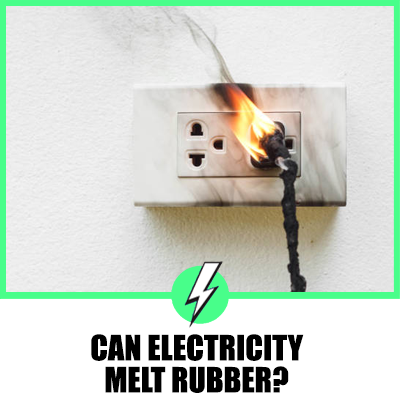Can Electricity Melt Rubber? A Comprehensive Examination
The world of materials science is full of fascinating questions.
One such question that often arises is, “Can electricity melt rubber?”
To answer this, we need to delve into the properties of rubber, its interaction with electricity, and the conditions under which it can conduct electricity.
This article aims to provide a detailed exploration of these topics.

Contents
Electricity and Rubber: An Overview
Rubber is a hydrocarbon comprising hydrogen and double bonds of carbon in a ratio of 5:8.
Each monomer (a unit of the polymer) exhibits a covalent bond.
This means its valence electrons are tightly connected and will not move freely in the presence of an electric potential.
When no electron jumps from one atom to another, conduction will fail.
But under certain conditions, such as when rubber comes into contact with additives like carbon at a certain temperature and pressure, it can conduct electricity.
Can Electricity Affect Rubber?
Yes, electricity can affect rubber, but not in the way it does conductive materials.
Rubber is an insulator, meaning it doesn’t readily conduct electricity.
However, the additives displace the covalent bond, causing stability.
As a result, electrons will begin to move freely and help the rubber product conduct when a potential is introduced.
Can Enough Electricity Melt Rubber?
Theoretically, yes.
If rubber is subjected to a high enough voltage, it can melt.
This is due to the heat generated by the resistance to the flow of electricity.
However, the voltage required would be extremely high, much higher than any standard electrical equipment would produce.
How Much Volts Can Rubber Withstand?
Rubber can withstand a significant amount of voltage before it begins to conduct electricity.
The exact amount depends on the thickness and type of rubber, but it’s generally in the order of tens of thousands of volts.
However, the voltage required to melt rubber would be much higher.
Why Does Electricity Affect Rubber?
Electricity affects rubber due to the heat generated by the resistance to the flow of electricity.
Rubber is a poor conductor of electricity, so when a high voltage is applied, the resistance generates heat.
If enough heat is generated, the rubber can melt.
Insights from Online Discussions
Online discussions provide a wealth of information on this topic.
For instance, a Reddit thread discusses how many volts it would take to overpower rubber.
The consensus is that it would require a very high voltage, much higher than any standard electrical equipment would produce.
On Quora, users discuss how much electricity rubber can conduct.
The general agreement is that rubber is a poor conductor of electricity, but it can conduct under certain conditions, such as when additives are introduced or when subjected to high voltages.
On Earth Eclipse, the discussion revolves around whether rubber can conduct electricity.
The article explains that rubber is generally an insulator and does not conduct electricity.
However, it can conduct under certain conditions, such as when additives are introduced.
On OKorder, users discuss how many amps of electricity it would take to destroy rubber.
The consensus is that it would require a very high amount of power, which is determined by multiplying the applied voltage by the resulting amps flowing through the rubber.
On Coi Rubber, the discussion revolves around rubber and electricity.
The article explains that rubber is generally an insulator and does not conduct electricity.
However, it can conduct under certain conditions, such as when additives are introduced or when subjected to high voltages.
On Biotrux, the discussion revolves around whether rubber can conduct electricity.
The article explains that rubber is generally an insulator and does not conduct electricity.
However, it can conduct under certain conditions, such as when additives are introduced or when subjected to high voltages.
Conclusion
In conclusion, while rubber is generally an insulator and does not conduct electricity, under certain conditions and with enough voltage, it can indeed conduct electricity and potentially melt.
However, these conditions are extreme and not typically encountered in everyday situations.
The insulating properties of rubber make it an excellent material for use in electrical safety equipment, such as gloves and boots, protecting workers from electrical hazards.





